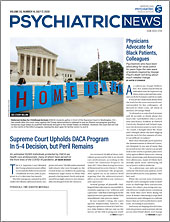APA’s Ethics Committee has received a number of questions related to ethical practice during the COVID-19 pandemic. Below is one of them, along with the committee’s response.
Q. I would appreciate your consideration of these questions, which have arisen at our public sector inpatient psychiatric facility: It was recently decided to have all admissions given nasopharyngeal swab screening for COVID-19. For patients who were admitted voluntarily prior to this decision, is it ethical to compel them to submit to testing as a condition for continued hospitalization, even if asymptomatic? For patients seeking voluntary admission and meeting medical necessity criteria for admission (that is, expressing suicidal ideation, homicidal ideation, or appearing unable to care for themselves), is it ethical to deny voluntary admission based on their refusal to voluntarily submit to testing? For example, would a psychiatrist be ethically justified to admit an otherwise voluntary patient involuntarily so as to force testing and continue with inpatient treatment thereafter?
A. While it is not recommended to force an individual patient, competent or not, to undergo nasopharyngeal swab for COVID-19 testing, clinical administrators of the unit do have an obligation to keep the other patients safe. They can meet this responsibility by maintaining the refusing patient in quarantine for 14 days, the time it would take for any individual exposed to a suspected or confirmed COVID-19-positive person to develop and exhibit symptoms of the infection, if the resources to do so are available. After 14 days without symptoms, the refusing patient would be deemed COVID-19 negative.
It may be unethical to deny admission to patients meeting medical necessity for psychiatric admission (voluntary or involuntary) based on their refusal to submit to testing for COVID-19, although in the setting of contagion and a global pandemic, institutions have broad latitude to protect the public health, and physicians have responsibilities to both individual patients and to the greater public good that must be balanced.
If there are other interventions available to clinicians to protect other patients on the unit from the newly admitted patient with unclear COVID-19 status and to protect the patient from him/herself, accommodations may be made. It is important to note that testing for COVID-19 is a medical and not a psychiatric intervention, and it is not based on the legal status of a patient’s admission, voluntary or involuntary. Competent patients have a right to refuse treatment or testing of any kind in ordinary circumstances, even if they were admitted to the hospital involuntarily.
For patients without the capacity for informed consent, their representative may have the authority to request testing against the patients’ wishes. It would be best, however, to work hard to avoid this situation as much as possible, for example, by quarantining patients, forming an alliance with them, and trying to obtain the testing through gaining their trust. If that proves not possible, the patient’s quarantine could be continued for 14 days.
Finally, isolating patients is not without risk to staff and without cost. For example, the added use of personal protective equipment at a time of shortage and the need for extra personnel may not be reasonable or responsible. Ultimately, the final consideration is a balancing between the individual patient and risk to other patients in the facility and the greater public health situation given the current global pandemic. It is important to be aware that every new admission is a risk to older, confined patients with comorbid conditions; under some circumstances, there could be an argument for limiting or pausing admission to a particular hospital and/or ethical imperative for at least a strong effort to persuade or induce unwilling patients to be tested in high-risk settings. Hospitals have the prerogative to set their admission standards and requirements for both voluntary and involuntary admission but not to violate the law in setting them. Infection control and management during the pandemic is a legitimate and paramount consideration for any facility, public or private.
Psychiatrists may wish to examine the laws in their jurisdictions regarding quarantine and other public health measures in an epidemic or pandemic regarding who, if anyone, may have the authority to mandate testing or isolation. As a public health issue, the commissioner for public health, rather than mental health, may be the legal authority regarding testing and other contagion-related guidance or regulations. ■
APA members with questions about ethics issues related to the COVID-19 pandemic may send them to the Ethics Committee at
[email protected]. The committee will respond directly to those who submit questions. More opinions are posted
here.

